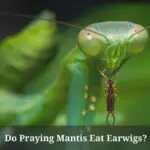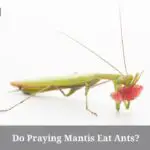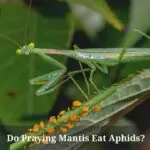Praying mantis are said to have the ability to eat cockroaches. But is it true that praying mantis can really eat cockroaches? And if yes, how exactly do praying mantis eat the cockroaches? This article has the answers.
Do praying mantis eat cockroaches? Yes, praying mantis do eat cockroaches. In hunting for cockroaches, praying mantis rely on the ambush strategy. Then after managing to ambush the cockroaches, they clutch them tightly using their powerful forearms, immobilize them and then eat the roaches alive.
Although a cockroach is a relatively big insect, the praying mantis is nonetheless able to eat it through that approach.
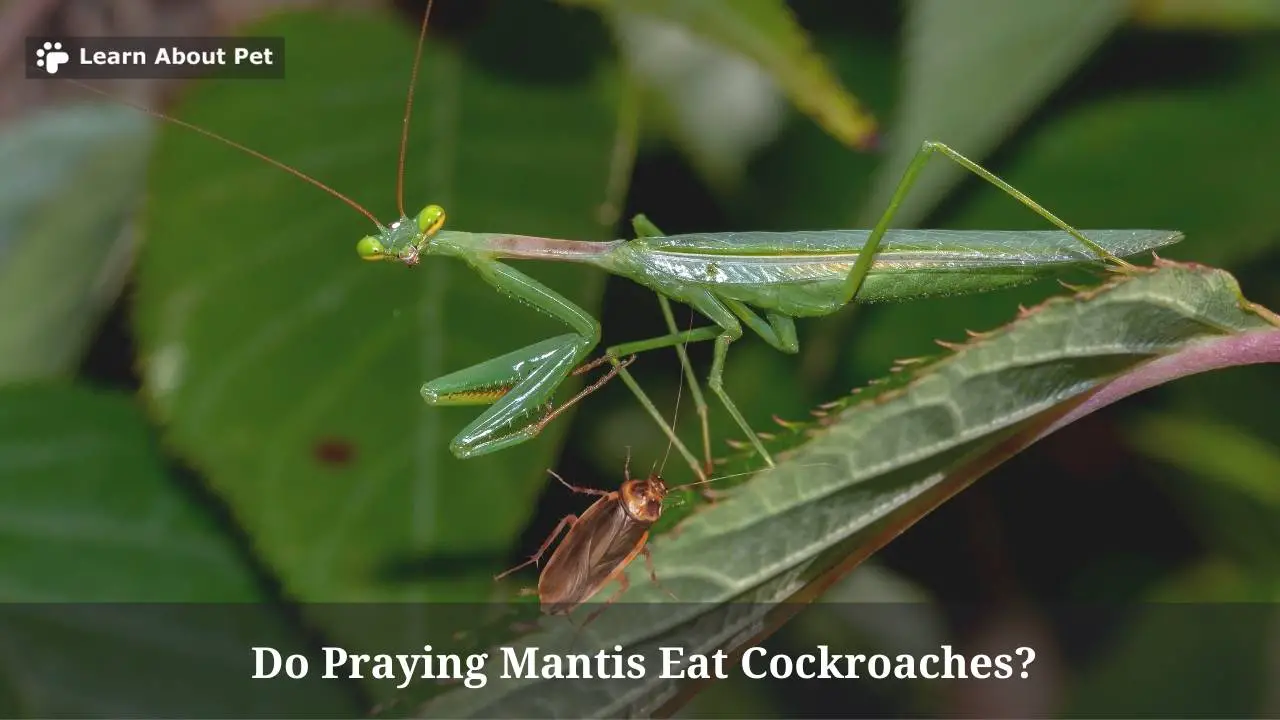
Are Cockroaches Safe For Praying Mantis?
Praying mantises have been feeding on cockroaches since time immemorial. The mantises don’t seem to suffer any real harm as a result of them eating cockroaches.
The only inference we can make then is that the cockroaches are safe for praying mantises.
Are Praying Mantis Capable Of Killing Cockroaches?
Yes, praying mantis are capable of killing cockroaches.
Granted, the cockroaches may appear relatively big, in comparison to praying mantises. But the mantises are nonetheless able to routinely ambush the roaches, and subsequently proceed to kill them.
Do Mantis Eat Cockroaches?
Yes, praying mantis do often eat cockroaches.
There have been many reports of praying mantises being sighted eating cockroaches. This shows that the mantises really do eat cockroaches.
It is even possible to find videos of mantises eating cockroaches. This only goes to prove that the phenomenon of mantises eating roaches is real.
The main question we should be asking ourselves is, how can praying mantis eat cockroaches, given the roaches’ relatively big size?
As it turns out, what the mantis does when it comes to hunting for cockroaches is simply ambush them. There are brown colored mantises that blend in very well with the earth.
Such mantises are usually able to lay very effective ambushes against cockroaches. Then they grasp and quickly immobilize the cockroaches using their remarkably powerful forelimbs.
Thereafter they dismember the cockroaches, eating them in small bits, until they are full (or until the cockroaches are finished).
Do Baby Praying Mantis Eat Cockroaches?
Baby praying mantises normally don’t eat cockroaches. Eating ‘tough’ insects like cockroaches and crickets is usually the preserve of more mature mantises.
Baby mantises typically feed on softer insects such as leafhoppers and aphids.
Which Cockroaches Do Praying Mantis Eat?
Cockroaches come in all manner of sizes and states. The question we now need to ask ourselves is which of those cockroach sizes and states mantises feed on.
So we seek to know whether the mantises eat live roaches, dead roaches, big roaches and small roaches. Let’s find out.
Do Praying Mantis Eat Live Cockroaches?
Yes, praying mantis do eat live cockroaches.
When a praying mantis that is looking for food happens to find a live cockroach, it may decide to take the roach on.
So the mantis simply ambushes the cockroach and eats it alive – bit by bit.
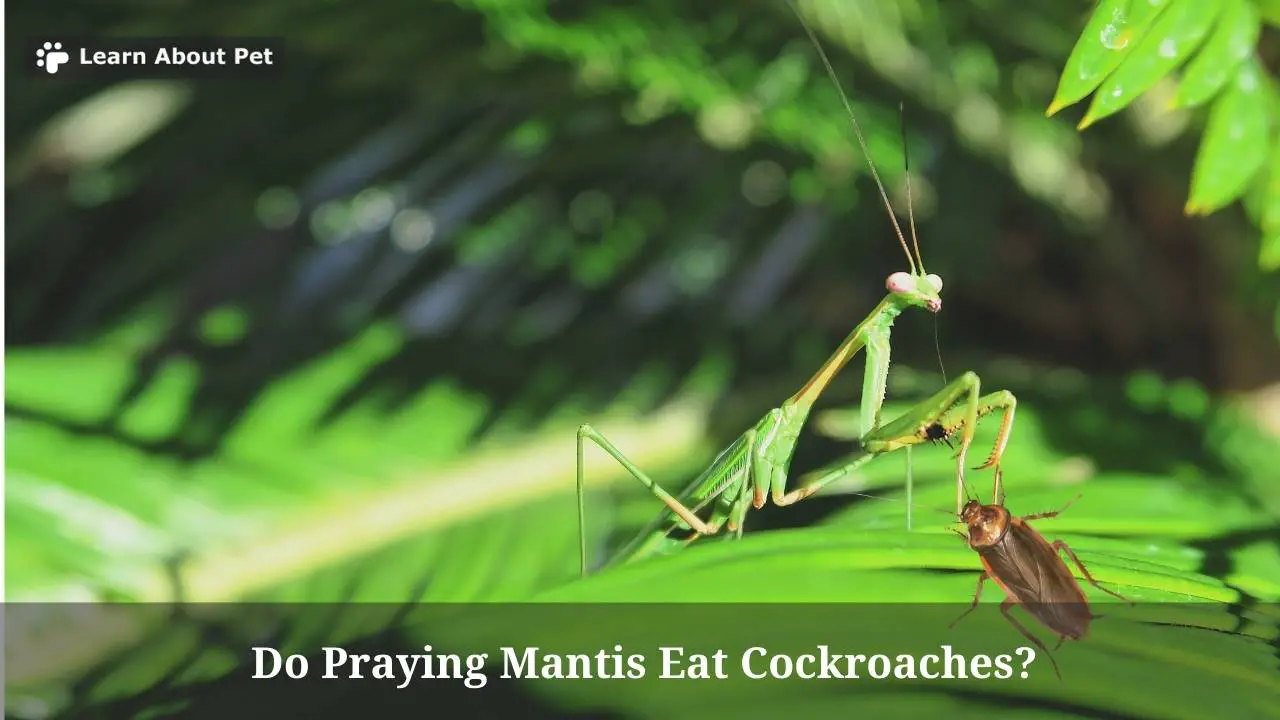
Do Praying Mantis Eat Dead Cockroaches?
No, praying mantises don’t eat dead cockroaches.
When a praying mantis discovers that a cockroach is dead, it desists from trying to eat it. Mantises prefer to eat live prey at all times: they don’t eat anything that they find already dead – including cockroaches.
Can A Praying Mantis Eat A Large Cockroach?
Yes, a praying mantis can eat a relatively large cockroach.
A large cockroach may look as if it is too big a deal for a mantis. But remember, mantises are even known to eat birds and lizards. Thus even the biggest cockroach is small game for a mantis.
Can A Praying Mantis Eat A Small Cockroach?
Yes, a praying mantis can eat a small cockroach.
Granted, small cockroaches tend to be rather fast on their feet. But praying mantises don’t chase after them, but rather, just ambush them quietly and thereafter get to feast on them.
How Often Will Praying Mantis Eat Cockroaches?
Having learnt that mantises do eat roaches, the next question is on how often a mantis can eat the roaches. For instance, do praying mantis eat cockroaches daily? Or just how often do the mantises eat the roaches?
The true position is that the praying mantises normally eat cockroaches once in a while. The mantis usually prefers to feed on a variety of things. It is unlikely that you would find a mantis feeding exclusively on cockroaches.
Thus under normal circumstances, a praying mantis will only eat cockroaches once in a while.
Final Verdict – Do Praying Mantis Eat Cockroaches
Praying mantis do eat cockroaches.
Although some cockroaches may be relatively big in comparison to praying mantis, the mantises are nonetheless able to capture such roaches (by ambushing them) and eat them.
It is normally the mature mantises that feed on cockroaches. Baby mantises usually eat softer insects, such as leafhoppers and aphids.
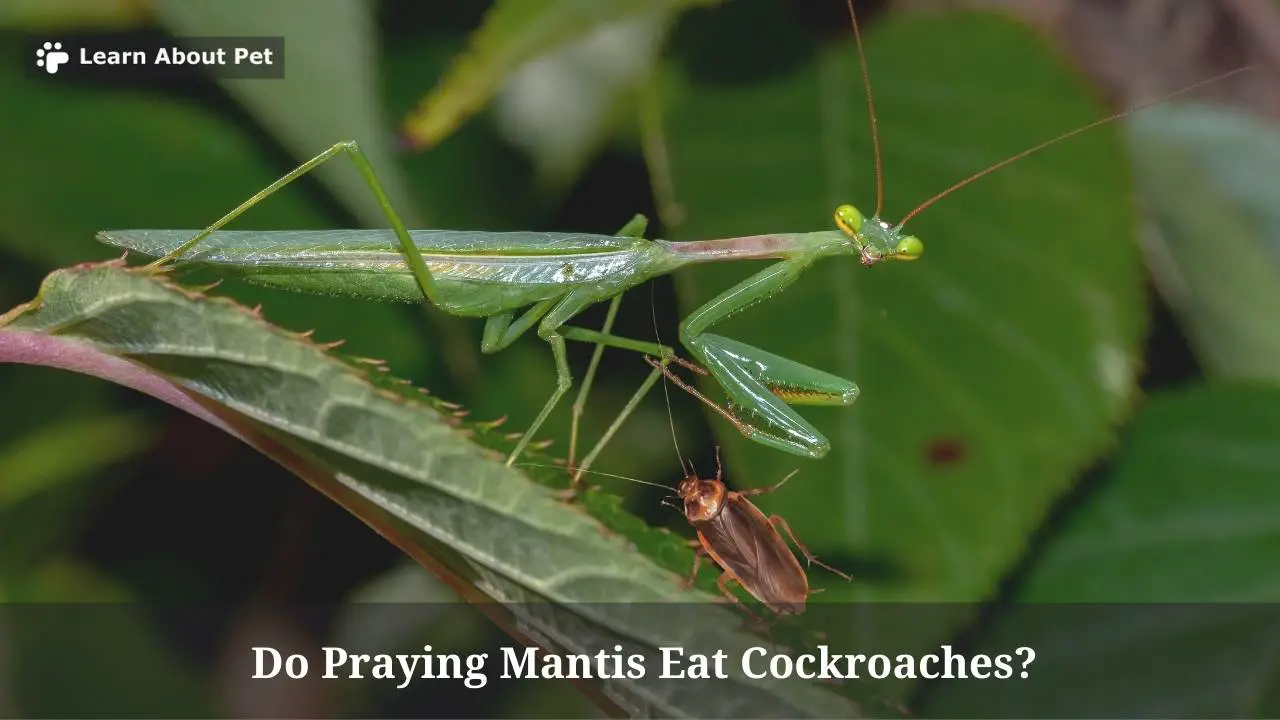
Thus if you have an adult pet mantis, you may consider feeding it on cockroaches once in a while. Just capture live cockroaches and present them to your adult mantis.
The mantis will usually proceed to devour the cockroaches, while seeming to relish the experience of eating the roaches.
As a pet lover, make sure to learn about pet more and give your pet mantis a good and comfortable life!

Welcome to Learn About Pet. My name is Rajkumar Ravichandran and I love all pets, travel, and amazing food. I write about my passion and personal experience caring for multiple pets in this blog! ❤️
Post Disclaimer
DISCLAIMER: THIS BLOG OR WEBSITE, "Learn About Pet", DOES NOT PROVIDE YOU WITH MEDICAL ADVICE AND IS NOT A SUBSTITUTE FOR MEDICAL ADVICE. ALWAYS GET IN TOUCH WITH YOUR PERSONAL VETERINARIAN AND USE INFORMATION HERE AS GENERAL ADVICE.
The information, including but not limited to, text, graphics, images and other material contained on this website are for informational purposes only. No material on this site is intended to be a substitute for professional veterinary advice, food recommendation, diagnosis, or treatment. Always seek the advice of your veterinarian or other qualified health care provider with any questions you may have regarding a medical condition or for pet food related questions.
